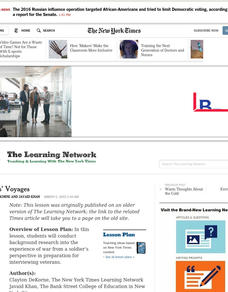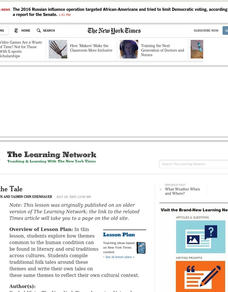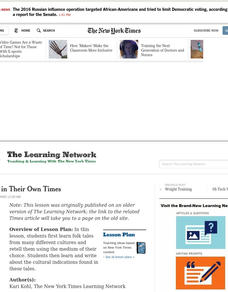Curated OER
Denial on Trial
What is the "Faurisson Affair”? What is “Holocaust Revisionism”? What does freedom of speech entail? Do revisionists have a right to voice their ideas? Such questions are at the heart of a richly detailed, thought provoking lesson...
Curated OER
Lesson Learned: Creating a Life Reports Project
Tap into the wisdom and knowledge of older members of the community with this New York Times plan. To warm up, learners write about and discuss advice they have been given. After reading "The Life Report," an op-ed column that asks older...
PBS
Historical Perspectives: Coming Home from War
What do the homecoming experiences of soldiers who fought in WWII, Vietnam, Iraq, and Afghanistan reveal about the politics and culture of the US during the time period of each war? Young historians view The Way We Get By, which tells...
Texas Instruments
Is It or Isn't It Proportional
How can you tell if number relationships are proportional? Mathematicians investigate proportional relationships. They compare and contrast functions and graphs to determine the characteristics of proportional relationships, as well as...
Curated OER
Descending to the Challenge: Developing Documentaries About the Deep Ocean
The video clip that comprises the warm up is not available, but the related article from The New York Times and the movie trailer for Aliens of the Deep are, leaving enough material to make this a fascinating lesson on deep-sea...
Curated OER
Veterans' Voyages
Introduce your middle and high schoolers to a different perspective on war: that of soldier's. Read Guisseppi Ungaretti's poem "Vigil" to kick-start this lesson. After discussing his perspective, read "The Screaming Eagles Fly to the...
Curated OER
To Tell the Tale
Students explore how themes common to the human condition can be found in literary and oral traditions across cultures. They compile traditional folk tales around these themes and write their own tales to reflect their own cultural context.
Curated OER
"I Cannot Tell a Lie"
Students examine and debunk historical myths, using the American Revolution as a starting point. They create and play a game of "American History: Fact or Fiction?"
Curated OER
2nd Grade - Act. 28: Calendar & Weather Book
Second graders will track the weather patterns throughout the school year. This project spans the school year and takes five minutes per day or less. Measuring, data collection, and predictions are all explored throughout this relevant...
Curated OER
Changing Planet: Black Carbon - a Dusty Situation
Introduce your young meteorologists to black carbon produced by the burning of fossil fuels by showing the video, "Changing Planet: Black Carbon." Viewers discover that deposition of this carbon on polar ice impacts the absorption of...
Curated OER
Legends in Their Own Times
Students learn folk tales from many different cultures and retell them using the medium of their choice. They write about the cultural indications found in these tales.
Curated OER
Sundials: Observing and Using Shadows
Students build sundials and observe changes in shadows over the course of one or more days. They identify patterns in the shadows and discuss how shadows may be used to tell time.
Mathematics Assessment Project
Multiplying Cells
Powers of two: it's a matter of doubling. A short summative assessment task asks pupils to determine a process to calculate the number of cells at given time intervals. They use powers of two in order to calculate the number of cells and...
Curated OER
Cool Colons
In this colons and time worksheet, 2nd graders review how colons are used to write the time. Students then circle the time that illustrates the correct placement of the colon and write it on the line. Students then fill in their own time...
Curated OER
How Do We Know...?
High schoolers identify and explain how various inventions and astronomers have improved our appreciation of the universe. Students identify at least two constellations in the sky and discuss how they were used in ancient times to tell...
Curated OER
The Grouchy Ladybug
Young scholars complete a Cirlce Map about time. They recall times during the grouchy ladybugs travels, and add dots on ladybugs using turn-around facts. Pupils correctly sequence the events of The Grouchy Ladybug. Students compose new...
Curated OER
Mars Calendar Project
Students design a calendar that displays time on Mars. They explore the differences between time on Earth and time on Mars while making the calendar.
Curated OER
New Picture Books to Complement Your Curriculum
These picture books are for primary learners and older students alike.
02 x 02 Worksheets
Inverse Variation
Discover an inverse variation pattern. A simple lesson plan design allows learners to explore a nonlinear pattern. Scholars analyze a distance, speed, and time relationship through tables and graphs. Eventually, they write an equation to...
Curated OER
Multimedia Storytelling
Experiment with multimedia storytelling. After watching a segment of American Family, first, middle and high schoolers tell a story about their families, clarifying the setting, characters, and script. They work on setting their story in...
Curated OER
Football Spelling
Third graders play a football spelling game where two teams spell words and gain yardage for each correctly spelled word. This clever spelling game will be highly motivational for your class! Each team gains ten yards every time they...
Florida Center for Reading Research
Fluency: Letter-Sound Correspondence, Letter-Sound Mix-Up
Scholars time each other as they work through a sheet of all 26 letters. They test each other to see how many letters sounds they can identify in one minute.
Curated OER
Narrative Writing vs. Explanatory Writing
The class discusses the different purposes an author has for writing. The focus of the discussion is on writing to tell a true story and writing to give information about a specific topic. There are writing purpose sorting cards embedded...
DiscoverE
Lego Structures
Let your class become master builders. Scholars use Legos® or K'nex® pieces to create a structure that looks like an actual building in existence. The time limit is 12 minutes, so you better start building!

























